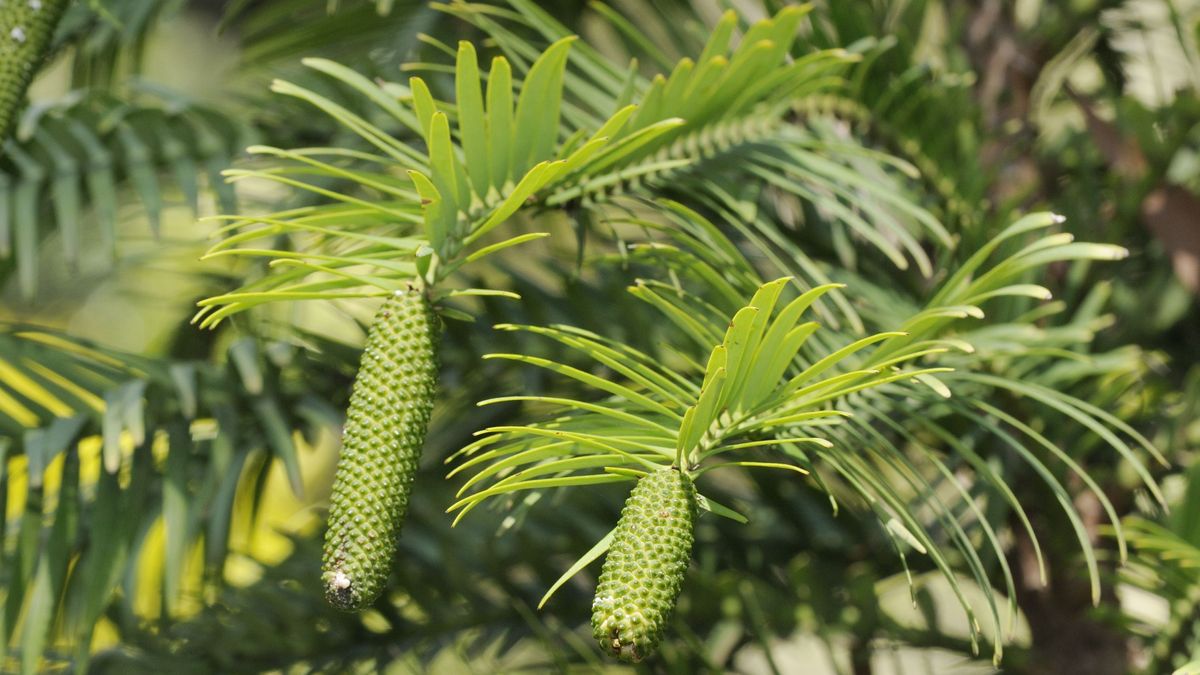In 1994, hikers discovered a group of strange trees growing in a canyon in Wollemi National Park, about 60 miles (100 kilometers) west of Sydney, Australia. One hiker notified a park service naturalist, who then showed leaf specimens to a botanist. It was ultimately determined they represented an ancient species that had been essentially frozen in time since dinosaurs roamed Earth.
Called a “living fossil” by some, the Wollemi pine (Wollemia nobilis) is nearly identical to preserved remains dating to the Cretaceous period (145 million to 66 million years ago). There are now just 60 of these trees in the wild — and these tenacious survivors are threatened by bushfires in the region. It was thought to have gone extinct around 2 million years ago.
Now, scientists from Australia, the United States and Italy have decoded its genome, shedding light on its unique evolution and reproductive habits, as well as aiding conservation efforts. The paper was posted to the preprint database bioRxiv on Aug. 24 and has not been peer reviewed.
Related: World’s deepest canyon is home to Asia’s tallest tree – and Chinese scientists only just found it
The pine has 26 chromosomes — containing a staggering 12.2 billion base pairs. In comparison, humans have only around 3 billion base pairs. Despite the size of their genome, Wollemi pines are extremely low in genetic diversity, suggesting a bottleneck (when the population is reduced dramatically) some 10,000 to 26,000 years ago.
Indeed, the plants do not exchange much genetic material. The remaining trees appear to reproduce mostly by cloning themselves through coppicing — in which suckers emerge from the base and become new trees.
Their rarity may be partly due to the high number of transposons, or “jumping genes” — stretches of DNA that can change their position within the genome. These elements also account for the genome’s size. “The tiniest plant genome and the largest plant genome have almost the same number of genes. Large differences in size usually come from transposons,” Gerald Schoenknecht, program director for the National Science Foundation’s Plant Genome Research Program told Live Science. Schoenknecht was not involved with the research, but the NSF did provide funding.
As transposons leap to new locations, they can change the sequence of “letters” in a DNA molecule, thus causing or reversing mutations in genes. They may carry functional DNA with them or alter DNA at the site of insertion, and thus have a substantial impact on the evolution of an organism.
If the transposons induced harmful mutations, they may have contributed to population decline precipitated by a changing climate and other factors, the researchers said. These stressful conditions may have led the plant to switch to clonal reproduction. Because increases in transposons correlate to sexual reproduction, a change to asexual reproduction may have reduced their potential introduction of damaging mutations. Paradoxically, while the trees were still reliant on sexual reproduction, the transposons may have played a role in increasing genetic diversity and thus at least temporarily made them more resilient to changing conditions.
“In 99% of all cases, mutations are probably not a good idea,” Schoenknecht said. “But over millions of years, the 1% that helps can move the species forward. In this case it may have been a bit of an advantage.”
Decoding the genome has also revealed why the Wollemi pine appears to be susceptible to disease — in particular, Phytophthora cinnamomi, a pathogenic water mold that causes dieback. The tree’s disease resistant genes are suppressed by a type of its own RNA that is associated with the development of wider leaves. Wollemi pines, unlike most conifers, have wide needles.
So, the evolution of wider leaves may have led to the suppression of disease resistance and opened the species up to pathogenic threats — which may have been inadvertently tracked in by hikers who illegally visited the protected spot. P. cinnamomi is common in cultivated plants.
While only four small populations remain in the wild, the pines have been extensively propagated by botanic gardens and other institutions in an effort to conserve them and study their unique biology. The species is considered critically endangered by the IUCN.
Thus, the analysis of the Wollemi pine’s genome is not simply an academic curiosity — it has serious implications for the species’ survival.













